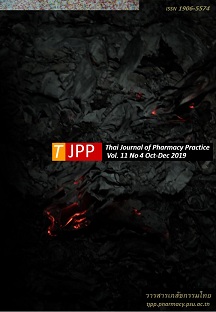ความรู้และทัศนคติในการใช้ยาเม็ดคุมกำเนิดชนิดฮอร์โมนรวมของหญิงไทยวัยเจริญพันธุ์
Main Article Content
บทคัดย่อ
วัตถุประสงค์: เพื่อสำรวจความรู้และทัศนคติเกี่ยวกับยาเม็ดคุมกำเนิดชนิดฮอร์โมนรวม (combined hormonal contraceptive pills: CHCPs) ของหญิงไทยวัยเจริญพันธุ์ วิธีการ: การสำรวจใช้ระเบียบวิจัยเชิงพรรณนาในสตรีเชื้อชาติไทย อายุระหว่าง 20 – 44 ปี ในอำเภอหาดใหญ่ จังหวัดสงขลา แต่ไม่รวมถึงสตรีที่ให้นมบุตรหรืออยู่ในช่วงหลังคลอดภายใน 6 สัปดาห์ การสำรวจใช้แบบสอบถามชนิดตอบด้วยตัวเอง เก็บข้อมูลพื้นฐานส่วนบุคคล ความรู้ และทัศนคติในการใช้ CHCPs ผลการวิจัย: ผู้ร่วมการวิจัย คือ หญิงไทยวัยเจริญพันธุ์ 412 คน อายุเฉลี่ย 29.6±8.3 ปี และมีระดับการศึกษาปริญญาตรีขึ้นไปร้อยละ 66.7 ตัวอย่างร้อยละ 30.6 มีประสบการณ์ใช้ CHCPs ตัวอย่างมีความรู้เฉลี่ยเท่ากับ 5.42 ± 4.03 คะแนน จากคะแนนเต็ม 15 คะแนน ตัวอย่างร้อยละ 66 มีความรู้เฉลี่ยน้อยกว่าร้อยละ 50 ของคะแนนเต็ม ตัวอย่างมากกว่าร้อยละ 50 ทราบวิธีการปฏิบัติตนเมื่อลืมรับประทานยา และประโยชน์ของยาเม็ดคุมกำเนิดบางชนิดในการรักษาสิว ขณะที่ตัวอย่างน้อยกว่าร้อยละ 25 เท่านั้นที่ทราบถึงวิธีการรับประทานยาต่อเนื่องและข้อควรระวังในการใช้ยา ตัวอย่างมีทัศนคติเฉลี่ยเท่ากับ 10.46 ± 2.86 คะแนน จากคะแนนเต็ม 15 คะแนน สรุป: ผู้หญิงไทยวัยเจริญพันธุ์ส่วนใหญ่ในพื้นที่ศึกษามีความรู้เกี่ยวกับ CHCPs น้อยกว่าร้อยละ 50 ของคะแนนประเมินเต็ม ดังนั้นบุคลากรทางการแพทย์จึงควรให้ความสำคัญในการให้ความรู้เรื่องการใช้ CHCPs แก่ผู้ที่มารับบริการ
Article Details
ผลการวิจัยและความคิดเห็นที่ปรากฏในบทความถือเป็นความคิดเห็นและอยู่ในความรับผิดชอบของผู้นิพนธ์ มิใช่ความเห็นหรือความรับผิดชอบของกองบรรณาธิการ หรือคณะเภสัชศาสตร์ มหาวิทยาลัยสงขลานครินทร์ ทั้งนี้ไม่รวมความผิดพลาดอันเกิดจากการพิมพ์ บทความที่ได้รับการเผยแพร่โดยวารสารเภสัชกรรมไทยถือเป็นสิทธิ์ของวารสารฯ
References
2. Areemit R, Thinkhamrop J, Kosuwon P, Kiatchoosa kun P, Sutra S, Thepsuthammarat K. Adolescent pregnancy: Thailand's national agenda. J Med Assoc Thai. 2012;95 Suppl 7:S134-42.
3. Butchon R, Liabsuetrakul T, McNeil E, Suchonwanich Y. Birth rates and pregnancy complications in adolescent pregnant women giving birth in the hospitals of Thailand. J Med Assoc Thai. 2014; 97: 785-90.
4. Aeamsamarng P, Srisuriyawet R, Homsin P. Risk Factors of unintended repeat pregnancy among adolescents. Public Health Journal of Burapha University 2013; 8: 55-67.
5. Sriyasak A, Almqvist AL, Sridawruang C, Neamsakul W, Haggstrom-Nordin E. Struggling with mother hood and coping with fatherhood- A grounded theory study among Thai teenagers. Midwifery 2016; 42: 1-9.
6. World Health Organization. Medical eligibility criteria for contraception use [online]. 2015 [cited May 25, 2018]. Available from: www.who.int.
7. Rosenberg M, Waugh MS. Causes and consequences of oral contraceptive noncompliance Am J Obstet Gynecol 1999;180: 276-9.
8. Rosenberg MJ, Waugh MS, Meehan TE. Use and misuse of oral contraceptives: risk indicators for poor pill taking and discontinuation. Contraception 1995; 51: 283-8.
9. Ngamsiriudom S. Health behavior of woman workers at two garment factories in Chiang Mai province: Knowledge and practice about contraceptive pill and injection [dissertation]. Chiang Mai: Chiang Mai University; 1991.
10. Chalongsuk R, Limmatvapirat C, Chaweekanlaya- kun K. Behevior and knowledge of oral contracep- tive pill of women in Nakhon Pathom province. Journal of Public Health and Development. 2005; 3: 11-9
11. World Health Organization. Sexual and reproductive health [online] 2014. [cited Nov 18, 2017]. Available from: www.who.int/reproductivehealth/topics/infertili ty/definitions/en/.
12. Yamane T. Statistic: An introductory analysis. 2nd ed. New York: Haper and Row; 1967
13. Ritter T, Dore A, McGeechan K. Contraceptive know ledge and attitudes among 14-24-year-olds in New South Wales, Australia. Aust N Z J Public Health 2015; 39: 267-9.
14. Bardaweel SK, Akour AA, Kilani M-VZ. Current knowledge, attitude, and patterns of oral contracep- tives utilization among women in Jordan. BMC Womens Health 2015; 15: 117.
15. Armstrong T. The Human odyssey: Navigating the twelve stages of life. New York: Sterling; 2008.
16. Nappi RE, Pellegrinelli A, Campolo F, Lanzo G, Santamaria V, Suragna A, et al. Effects of combined hormonal contraception on health and wellbeing: women's knowledge in northern Italy. Eur J Contracept Reprod Health Care 2015;20:36-46.
17. Machado RB, Morimoto M, Santana N, Arruda LF, Bernardes CR, de Souza IM. Effect of information on the perception of users and prospective users of combined oral contraceptives regarding the risk of venous thromboembolism. Gynecol Endocrinol 2015; 31:57-60.
18. Saelim J, Santibenchakul S, Jaisamrarn U. Comparison of the knowledge, attitudes toward, and practices of contraception between Thai Muslim women living in Bangkok and those living in the southernmost provinces of Thailand. Asian Biomed 2017; 10: 351-9.

